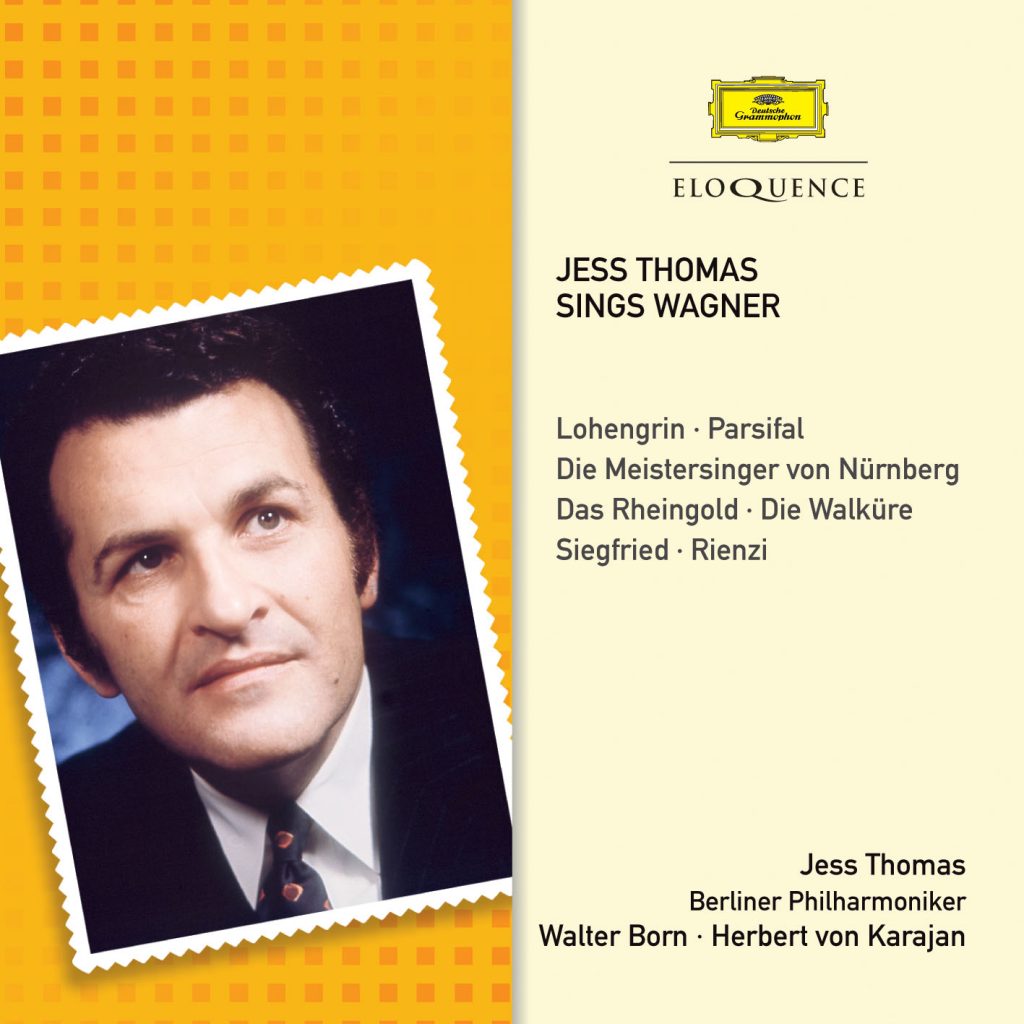Among the many Heldentenoren spoken of in glowing terms, perhaps none has been so unfairly neglected as Jess Thomas. Full-throated and resplendent, not a hint of strain, an amazing array of colours in the voice (from sotto voce to overpowering), he possessed an artistry that was not only a thrill in the theatre but that was beautifully caught in the recording studio – except, his studio recordings are few and far between. The only recital record of note was a showcase of Wagner arias he made with the Berlin Philharmonic (no less) and Walter Born in 1963. This recital appears in its entirety, for the first time internationally on CD, topped and tailed by scenes from ‘Siegfried’ with Herbert von Karajan and the closing scene from ‘Lohengrin’, recorded ‘live’ in Bayreuth with Wolfgang Sawallisch.
Born in 1927, in Hot Springs, South Dakota in the US, Thomas studied psychology at the University of Nebraska, worked for four years as a psychological adviser at a high school and then embarked on postgraduate studies at Stanford University, California. The professor of singing there, Otto Schulmann, had worked before the war as a répétiteur for Karajan in Ulm; he heard Thomas and encouraged him to pursue a singing career. After studying intensively with Schulmann for three years and making his début in 1957 at San Francisco in the baritone role of Faninal in Der Rosenkavalier, Thomas, like most gifted American singing graduates at the time, gravitated to Germany, the home of his preferred repertoire and a country with many opera houses. He spent three years at the Karlsruhe Opera, where his first role was Lohengrin. His breakthrough in larger houses came when the opera producer, Wieland Wagner, the composer’s grandson, cast him both in Parsifal at Bayreuth under Hans Knappertsbusch – with whom Thomas would enjoy some of his most memorable musical experiences – and as Radames in Berlin, under Karl Böhm. Thomas was both linguistically and musically more attracted to the greater depth, as he saw it, of Wagner’s works: ‘Wagner revolutionised the entire world of opera and not only with respect to the music but above all in the fusion of music and drama’. He began to learn heavier Wagnerian roles such as Tannhäuser, Tristan and Siegfried.
Karajan chose him as his Siegfried in his studio recording of the ‘Ring’, he recorded Lohengrin with Kempe and Hans Sachs with Keilberth.
With insightful notes by Alan Newcombe, this release is a fascinating portrait of one of the greatest Wagner voices of any era.
RICHARD WAGNER
Siegfried:
Daß der mein Vater nicht ist
Nun sing’! Ich lausche dem Gesang
Catherine Gayer, soprano
Selige Öde auf sonniger Höh’!
Das ist kein Mann!
Berliner Philharmoniker
Herbert von Karajan
Die Meistersinger von Nürnberg:
Fanget an!
Morgenlich leuchtend im rosigen Schein
Die Walküre:
Ein Schwert verhieß mir der Vater
Das Rheingold:
Immer ist Undank Loges Lohn!
Rienzi:
Allmächt’ger Vater
Parsifal:
Nur eine Waffe taugt
Lohengrin:
Höchstes Vertrauen hast du mir schon zu danken
In fernem Land, unnahbar euren Schritten
Berliner Philharmoniker
Walter Born
Mein lieber Schwan! … Fahr’ heim!
Chor und Orchester der Bayreuther Festspiele
Wolfgang Sawallisch
Jess Thomas, tenor
Recording Producers: Hans Weber (Berlin); Volker Straus (Bayreuth)
Balance Engineers: Günter Hermanns (Berlin); Hans Lauterslager, Jan Vermeulen (Bayreuth)
Recording Locations: Jesus-Christus-Kirche, Berlin, Germany, 2–12 December 1968 and 3 February 1969 (Karajan), 18–20 March 1963 (Born); live in the Festspielhaus, Bayreuth, Germany, July 1962 (Sawallisch)
‘And now there is Jess Thomas, a young American tenor who is in some ways the most promising of all, for he has the heft of voice and the genuine ring on top to move eventually into the most demanding of the Wagner roles … The sound is excellent, the orchestral playing first-rate.’
High Fidelity
‘I heard Jess Thomas, the American tenor, at Bayreuth last year singing Lohengrin like an angel. My simile is as yet relative, as I have not yet reached that stage, but relative also in the sense that so many of the native-born Wagnerian tenors one encounters emit sounds which to my ear do not qualify as ‘singing’ at all, being rather related to the noise newsboys make when calling a paper; i.e., a strong, carrying shout … Mr. Thomas sings, and sings most sensitively, producing a steady flow of pleasing tone. He sings with intelligence and musicianship, too.’ Gramophone

